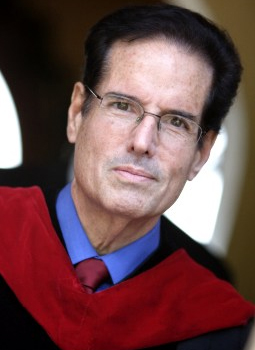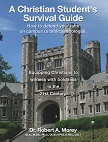ENCYCLOPEDIA OF BIBLE DIFFICULTIES
By Dr. Gleason L. Archer Jr. (05/22/16 -- 04/27/2004), a graduate of Harvard University and he knew over 30 languages
Does the Bible class abortion with murder?
Surgical abortion was hardly possible until the development of modern techniques in t he operating room; in ancient times the babies we re killed in the womb on l y when their mother was also slain. An example is Amos 1:13: "Thus says the Lord, 'For three transgressions of t h e sons of Ammon and for four I will not revoke its punishment, because they ripped open the pregnant women of Gilead in order to enlarge their borders'" (NASB). But now t ha t the Unitecl States Supreme Court has questioned the hum an status of a fetus in the womb until it reaches an advanced stage of gestation, it becomes essential to establish from Scripture what God 's view is on this matter.
At what stage does God consider the fetus to be a human being, so that the taking of its life may be considered manslaughter ?
Psalm 139:13 indicates very definitely that God 's personal regard for the embryo begins from the time of its inception. The psalmist says, "For Thou didst form my inward parts; Thou didst weave me in my mother's womb" (NASB). Verse 16 continues, "Thine eyes have seen my unformed substance; and in Thy book they were all written, the days that were ordained for me, when as yet there was not one of them " (NASB). It is reassuring to know that even though many thou sands of embryos and fetuses are deliberately aborted every year throughout the world, God cares about the unborn and takes personal knowledge of them just as truly before they are born as after their delivery. He has their genetic code all worked out and has a definite plan for their lives (according to v. I 6).
In Jeremiah1:5 the Lord says to the young prophet on the threshold of his career, "Before I formed you in the womb I knew you, and before yo u were born I consecrated you: I have appointed you a prophet to the nations" (ASB) . This certainly implies that God foreknew this lad even before he was conceived in his mother's womb. Apparently we human beings have an identity in God's mind that is estab lished "from everlasting"-long before conception as an embryo. Second, the verse teaches that it is God Himself who forms that fetus and governs and controls all those "nat ural" processes that bring about the miracle of human life. Third, God has a definite plan and purpose for our lives, and each of us really matters to Him. Therefore anyone who takes the life of any human being at any stage in his life's career will have to reckon with God. "Whoever sheds man's blood, by man his blood shall be shed, for in the image of God He made man " (Gen. 9:6, NASB). When does a n embryo begin to be a creature made in the image of God ? From the moment of conception in the womb, Scripture says. Therefore God will require his blood at the hands of his murderer, whether the abortionist be a medical doctor or a nonprofessional.
In Isaiah 49:1, the messianic Servant
of the Lord is quoted as saying, "Yahweh has called Me from the womb; from the body of My mother He named Me." This raises the interesting question for the Supreme Court to answer: At what point in the gestation period of Christ in Mary's womb did the Lord Jesus begin to be the Son of God? At w hat time between conception and birth would an abor tion of that Baby have amounted to heinous sacrilege? After three months ? After three days? After three minutes? The angel said to Mary at the Annunciation: "The Holy Spirit will come upon you, and the power of the Most High will overshadow you; so the holy one to be born will be called the Son of God" (Luke 1 :35). When did the miracle of the Incarnation take place? Was it not at the very moment of conception?
Luke 1:15 brings out a similar point concerning John the Baptist: "For he will be great in the sight of the Lord .. . and he will be filled with the Hol y Spirit even from birth ." We are not told at what stage in his mother's preg nancy that greatest of all human prophets (Matt. 11 :11) began to be filled with the Third Person of the Trinity; but it may well ha ve been earlier than the stage set by the Supreme Court as being "viable." What we do know for certain is that at about six mont hs of gestation John's mother, Elizabeth, felt him leap in her womb when Mary entered the room (Luke 1:41 ,44); for Elizabeth cried out with joy after Mary greeted her: "When the sound of your greeting reached my ears, the baby in my womb leaped for joy." The Third Person of the Trinity responded with joy when the future mother of Jesus Christ, the Second Person, came into the same room . How fortunate for the human race that no abortionist's knife came near either of those two embryos!
In earlier years of the current abortion controversy, it used to be said even by some Evangelical scholars that Exodus 21:22-25 implied that the killing
of an unborn fetus involved a lesser degree of culpability than the slaughter of a child already born. This was based on an unfortunate mistranslation of the Hebrew original. Even the text rendering of the NASB perpetuates this misunderstanding, quite as much as the KJV: "And if men struggle with each other and strike a woman with child so that she has a miscarriage, ye t there is no further injury, he shall surely be fined as the woman 's husband may demand of him ; and he shall pa y as the judges decide. But if there is
any further injur y, then you shall appoint as a penalty life for life, eye for eye, tooth for tooth, hand for hand, foot for foot, etc."
In the margin the NASB acknowl
edges that ufya,f'u f ladeyiih (w hich it renders "so that she has a miscarriage") it literally means "her children come out." The same term used for a child from infancy to the age of twelve is
used here: yeled in the singular, yeladim in the plural. (The plural is
used here because the woman mig ht be pregnant with twins when this injury befalls her.) The result of this blow to her womb is that her child (children) will be aborted from her womb and (if she is fortunate) will come forth a live. The second important observation is that the "further" inserted by NASB (in italics) does not appear in the Hebrew, nor-in the opinion of this writer-is it even implied in the Hebrew. The Hebrew as it stands (for the third clause) is perfectly clear: "and there is no injury" (w e lo' yihyeh 'ason). Thus the whole sentence really should be translated "And when men struggle to gether and strike a pregnant woman [or 'wife'] and her chi ldren come forth, but there is no injury, he shall be cer tainly fined, as the husband of the woman shall impose on him, and he shall give [or ' pay'] in [the presence of] the judges; but if there shall be an injury, then you shall pay life for life [nepes tal),anapes]."
There is no ambiguity here whatever. What is required is that if there should be an injury either to the mother or to her children, the injury
shall be avenged by a like injury to the assailant. If it involves the life (ne-pes) of the premature baby, then the assailant shall pay for it with his life. There is no second-class status attached to the fetus under this rule; he is avenged just as if he were a normally delivered child or an older person: life for life. Or if the injury is less, but not serious enough to involve inflicting a like injury on the offender, then he may offer compensation in monetary dam ages, according to the amount pre scribed by the husband of the injured woman . Monetary damages usually are required when a baby i s born prema turel y, for there are apt to be extra ex penses both for medical attention and for extra care.
If, then, the taking of the life of a human fetus is to be classed as homicide as the Bible clearly implies the question arises as to whether such homicide is ever justifiable. Nat urally we are not talking about the imposition of public justice against offenders who have been officially tried and convicted of such crimes as the worship of false gods, infant sacrifice, witchcraft, blasphemy against Yahweh, first-degree murder, adultery, incest (execution for these crimes was to be by stoning, the sword, or burning at the stake [cf. Lev . 20:2- 5,14 , 20,27; 24:15-17; Deut. 13:1-5, 15; 17:2-7 ; 22:22-24]). Such punitive measures are to be classed as execution rather than homicide. But in a case of self-defense or of defending the home against a burglar during the night (Exod . 22:2), the taking of human life was considered justified in order to prevent an even greater injustice by allowing the criminal to victimize or slaughter the innocent.
There is no specific treatment in the Bible of the problem posed when the continuance of the fetus in the womb means a serious threat to the life of the mother. It may be reasonably concluded that an actual life is of more intrinsic value than a potential life especially if the well-being of other children is at stake.
In most cases it turns out that babies
who would have turned out to be so defective as to be incapable of a meaningful life die at childbirth or soon afterward. Nevertheless, there are some who never achieve human rationality and survive for a period of years. Unlike the ancients, we now have diagnostic techniques that can warn the obstetrician or the expectant mother that the uterus contains such a freak and that only a harrowing heartbreak is in store for the family and parents if the fetus is allowed to come to full term. Conceivably a case can be made out for the termination of its life by abortion. But this is a very dubious procedure to follow unless the malformation of the embryo is established beyond all doubt. It is usually better to let "nature" (i .e., the good providence of God) take its course.
In the case of involuntary conceptions such as rape or incest, while the injustice to the pregnant woman is beyond question, it is more than doubtful whether the injustice done to the unborn child is not even greater, should its life be terminated by surgery before it is born. The psychological trauma to the mother may be severe, and yet it is capable of being successfully handled by one who is innocent of wrongdoing and has no consciousness of personal guilt in the whole affair. It can be coped with by a submissive faith and trust in God for abilit y to handle the new situation created by the arrival of the baby. If the mother should feel unwilling to raise the child herself, there are man y other childless couples who would be glad to adopt the little one and raise it as their own.
In the case of incest, adoption is almost obligatory, since it would be almost impossible for a child fathered by its grandfather or uncle to maintain any kind of self-respect if it should later find out the truth. Nevertheless this tragic consequence can be avoided through adoption, and it is very ques tionable whether abortion would be justified even under such an extreme circumstance as incest. The child's right to live should remain the paramount consideration in almost every instance. (Perhaps it should be pointed out in this connection that according to Gen. 19:36 -38, the ancestor of the Moabite nation and that of the Ammonite nation were both born from an incestuous relationship- though in that special case the father, Lot, was hardly responsible for this offense.)






































